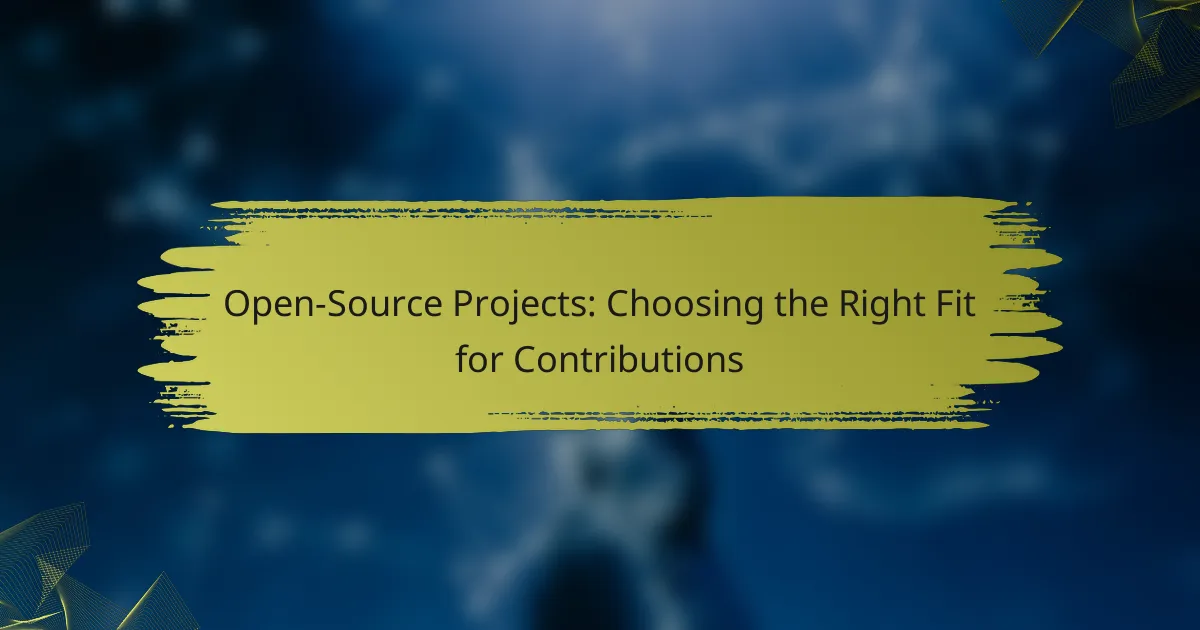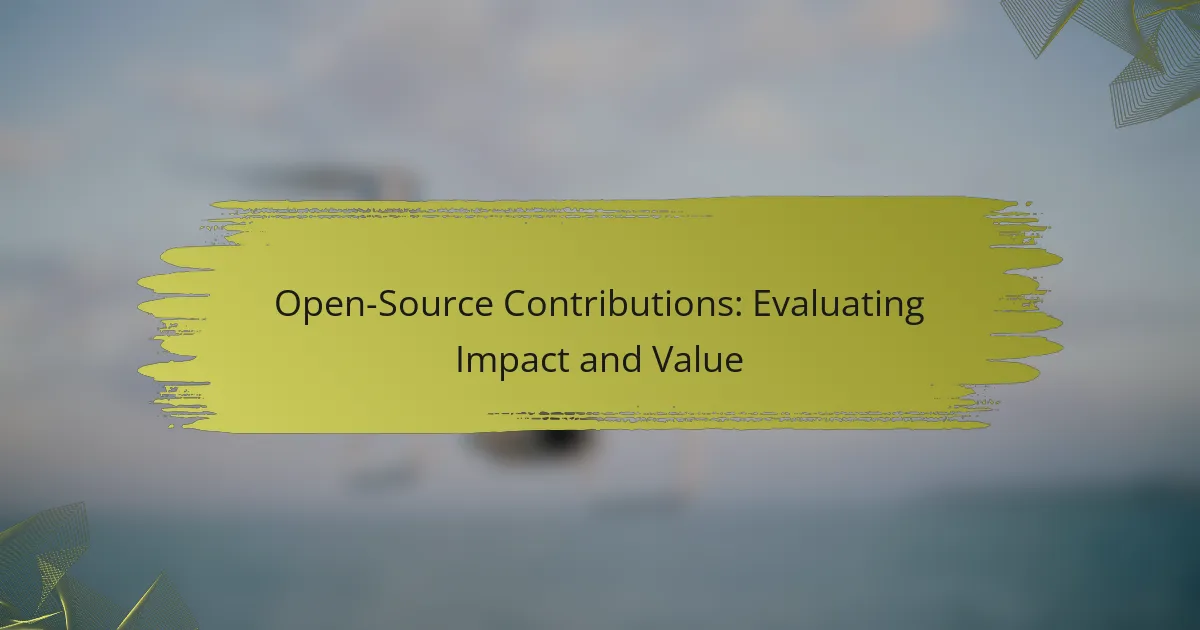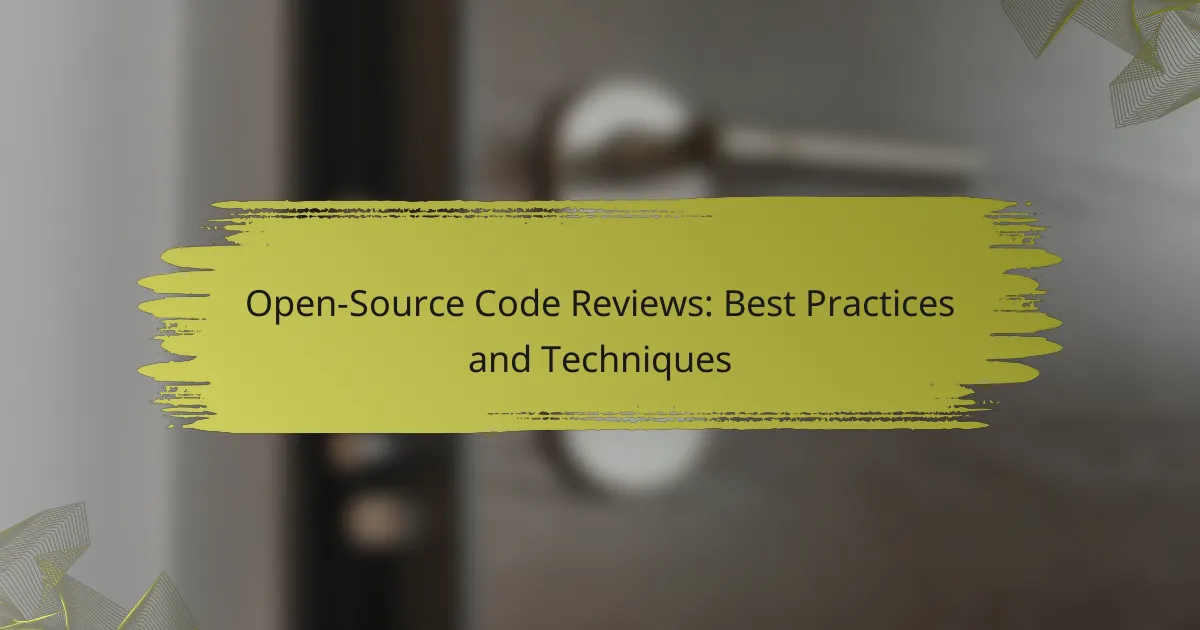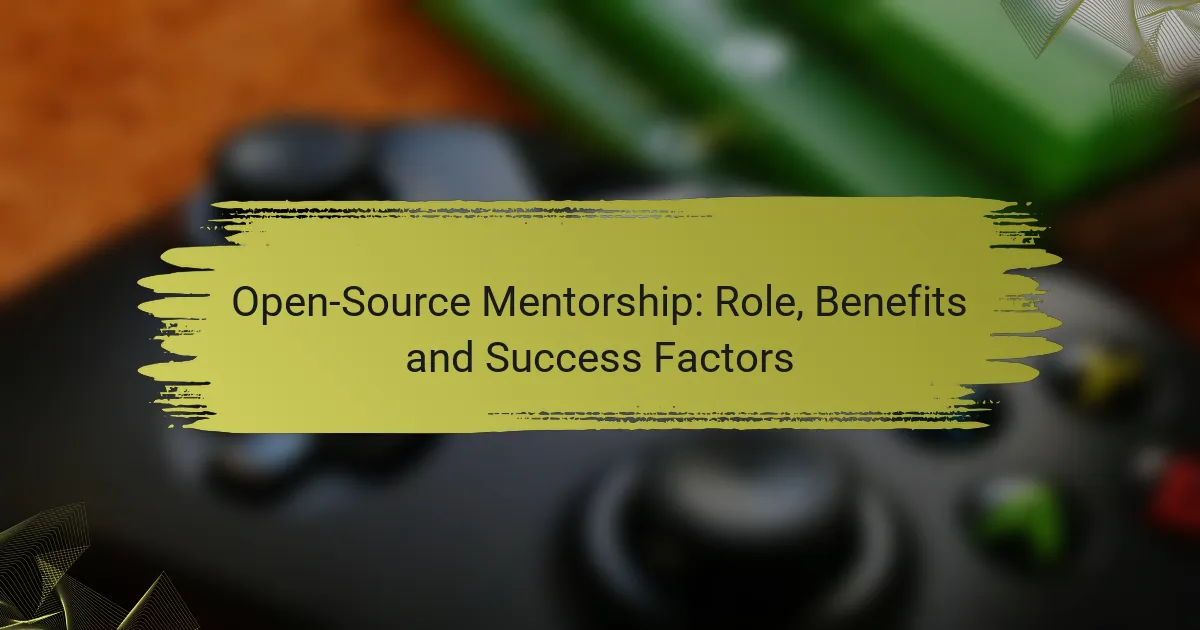Choosing the right open-source project for contributions is essential for meaningful engagement and personal growth. By evaluating factors such as project activity, community involvement, and documentation quality, contributors can find a project that aligns with their skills and interests. Engaging in these projects not only enhances technical abilities but also fosters valuable networking opportunities within the tech community.
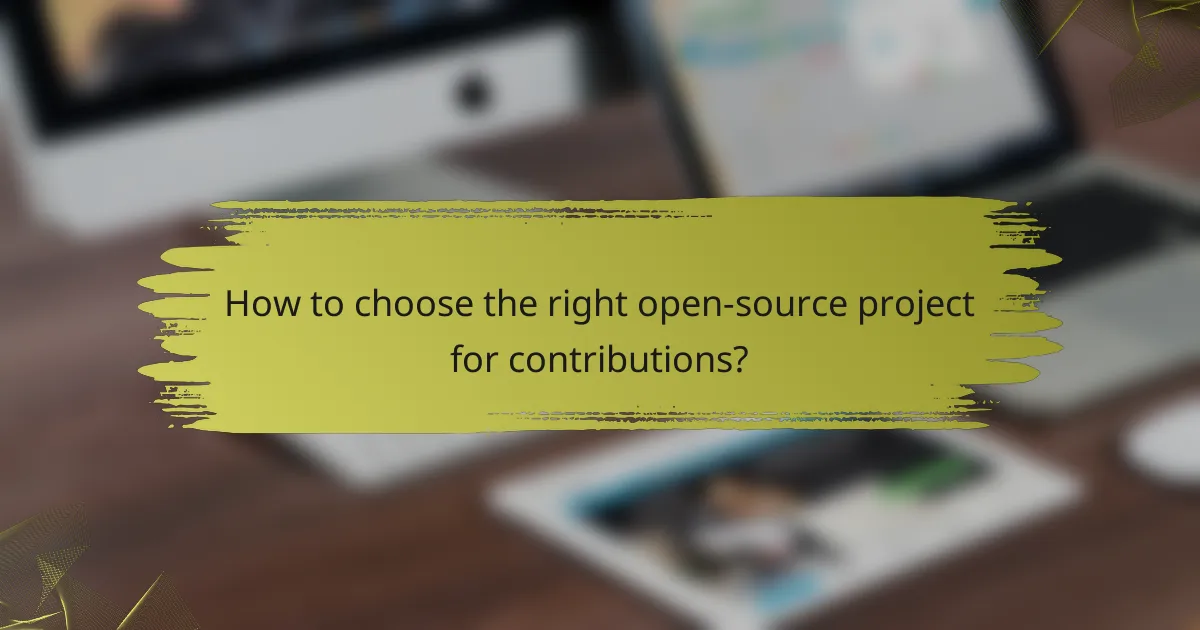
How to choose the right open-source project for contributions?
Choosing the right open-source project for contributions involves evaluating various factors such as project activity, community engagement, documentation quality, contribution guidelines, and alignment with your personal skills. These criteria help ensure that your contributions are meaningful and that you can effectively collaborate with others.
Assess project activity levels
Project activity levels indicate how frequently updates and contributions occur. Look for projects with regular commits, active issue discussions, and recent releases, as these suggest a healthy and ongoing development process. A project that has been inactive for several months may not be the best choice for contributions.
Check platforms like GitHub for metrics such as the number of open issues, pull requests, and recent commits. A project with a vibrant activity level typically has a community that is engaged and responsive.
Evaluate community engagement
Community engagement is crucial for a positive contribution experience. Assess how welcoming and responsive the community is by observing discussions in forums, chat channels, or issue trackers. A supportive community can provide guidance and feedback, making it easier to integrate your contributions.
Look for projects that have clear communication channels, such as Slack or Discord, where contributors can ask questions and share ideas. Engaged communities often host events or have mentorship programs that can further enhance your experience.
Review project documentation quality
High-quality documentation is essential for understanding a project’s structure and contribution process. Review the README file, contribution guidelines, and any additional documentation available. Well-documented projects typically provide clear instructions on how to get started and contribute effectively.
Good documentation should include setup instructions, coding standards, and examples of previous contributions. If documentation is sparse or unclear, it may lead to frustration and hinder your ability to contribute meaningfully.
Check contribution guidelines
Contribution guidelines outline the expectations and processes for contributing to a project. Before diving in, read these guidelines carefully to understand how to submit code, report issues, or suggest features. Adhering to these guidelines is crucial for your contributions to be accepted.
Look for specific requirements such as coding style, testing protocols, and the process for submitting pull requests. Projects with clear and comprehensive guidelines are often more organized and easier to navigate for new contributors.
Identify project alignment with personal skills
Aligning a project with your personal skills and interests increases the likelihood of a rewarding contribution experience. Consider your technical expertise, interests in specific technologies, or areas you wish to learn more about. Choose projects that match your skill set to maximize your impact.
For example, if you are proficient in JavaScript, seek out web development projects that utilize this language. Engaging with projects that resonate with your skills can lead to more meaningful contributions and personal growth.
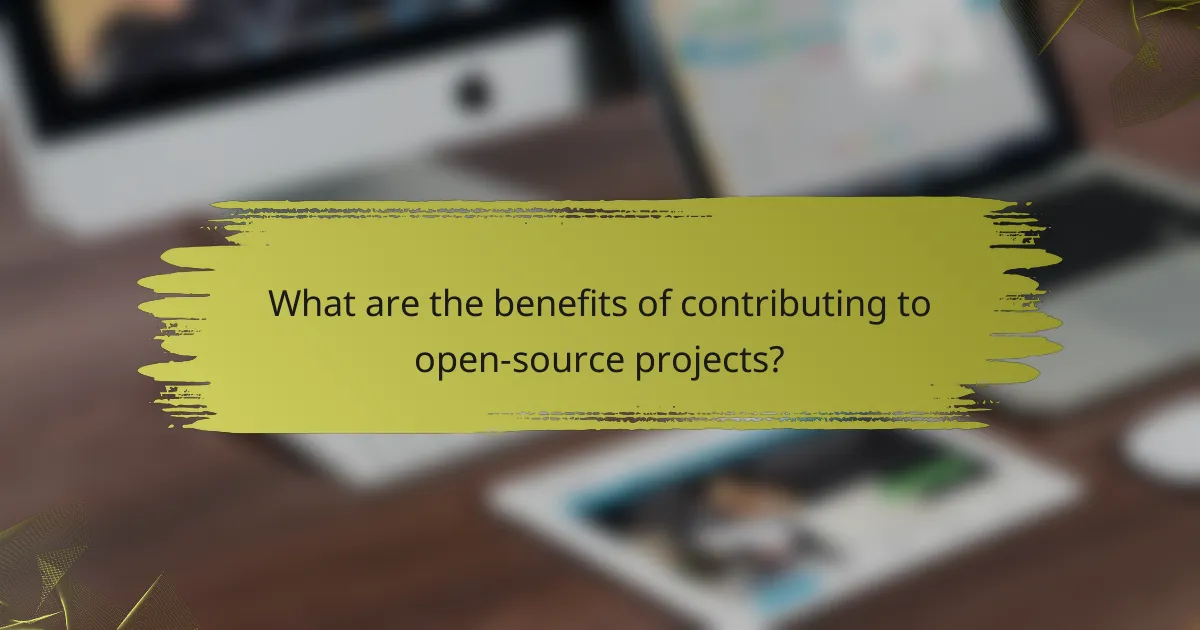
What are the benefits of contributing to open-source projects?
Contributing to open-source projects offers numerous advantages, including skill enhancement, networking opportunities, and increased visibility in the tech community. Engaging in these projects allows individuals to collaborate with others, learn from real-world codebases, and showcase their work to potential employers.
Enhances coding skills
Participating in open-source projects significantly improves coding skills by exposing contributors to diverse coding practices and styles. Contributors can learn new programming languages, frameworks, and tools while working on real-world problems, which can be more effective than traditional learning methods.
To maximize skill enhancement, focus on projects that align with your current interests or areas where you want to grow. Start with smaller issues or documentation tasks to build confidence before tackling more complex challenges.
Builds professional network
Contributing to open-source projects helps build a professional network by connecting you with other developers, project maintainers, and industry experts. Engaging in discussions, code reviews, and collaborative problem-solving fosters relationships that can lead to job opportunities or mentorship.
To expand your network, actively participate in community forums, attend related meetups or conferences, and contribute to discussions on platforms like GitHub or GitLab. These interactions can lead to valuable connections in the tech industry.
Increases visibility in the tech community
Contributing to open-source projects increases your visibility in the tech community, showcasing your skills and commitment to potential employers. A well-maintained portfolio of contributions can serve as a strong resume, demonstrating your ability to work collaboratively and solve complex problems.
To enhance your visibility, ensure that your contributions are well-documented and highlight your role in the projects. Share your experiences on social media platforms and professional networks like LinkedIn to attract attention from recruiters and peers alike.
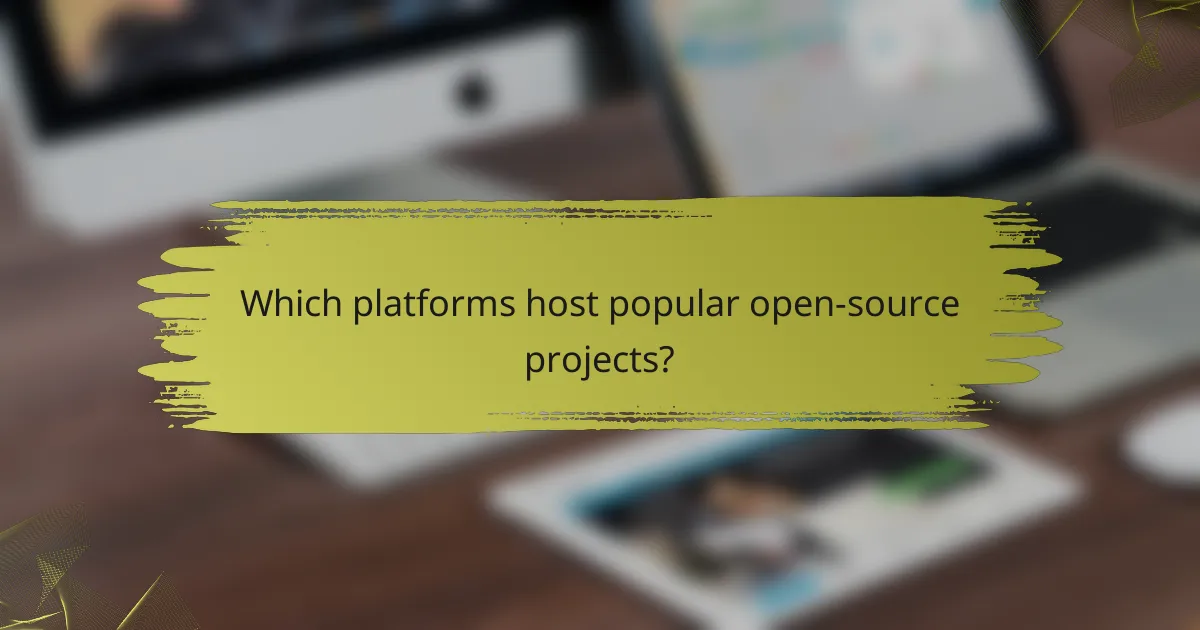
Which platforms host popular open-source projects?
Popular open-source projects are primarily hosted on platforms like GitHub, GitLab, and SourceForge. Each platform offers unique features that cater to different types of projects and developer needs.
GitHub as a leading platform
GitHub is the most widely used platform for open-source projects, hosting millions of repositories. Its user-friendly interface and robust version control system make it ideal for both beginners and experienced developers.
When choosing GitHub, consider its extensive community and integration with various tools. It supports collaboration through pull requests, issues, and project boards, which streamline the development process.
However, be aware of GitHub’s licensing options and ensure that your project aligns with your chosen license to avoid legal complications.
GitLab for collaborative development
GitLab is known for its strong focus on collaboration and DevOps integration. It offers built-in CI/CD tools that facilitate continuous integration and deployment, making it suitable for teams looking to streamline their workflow.
Using GitLab can enhance team collaboration through features like merge requests and issue tracking. It also allows for private repositories at no cost, which is beneficial for organizations that require confidentiality.
Keep in mind that while GitLab is powerful, its interface may be less intuitive for newcomers compared to GitHub, so some initial learning may be necessary.
SourceForge for legacy projects
SourceForge is a platform that has been around for many years and is often associated with older open-source projects. It provides a repository for legacy software and is still a viable option for maintaining established projects.
One advantage of SourceForge is its ability to host projects that may not fit into the more modern workflows of GitHub or GitLab. It offers features like download statistics and project documentation, which can be useful for legacy software.
However, SourceForge’s user base is smaller, which may limit community engagement compared to more popular platforms. Consider your project’s needs and audience when deciding if SourceForge is the right fit.
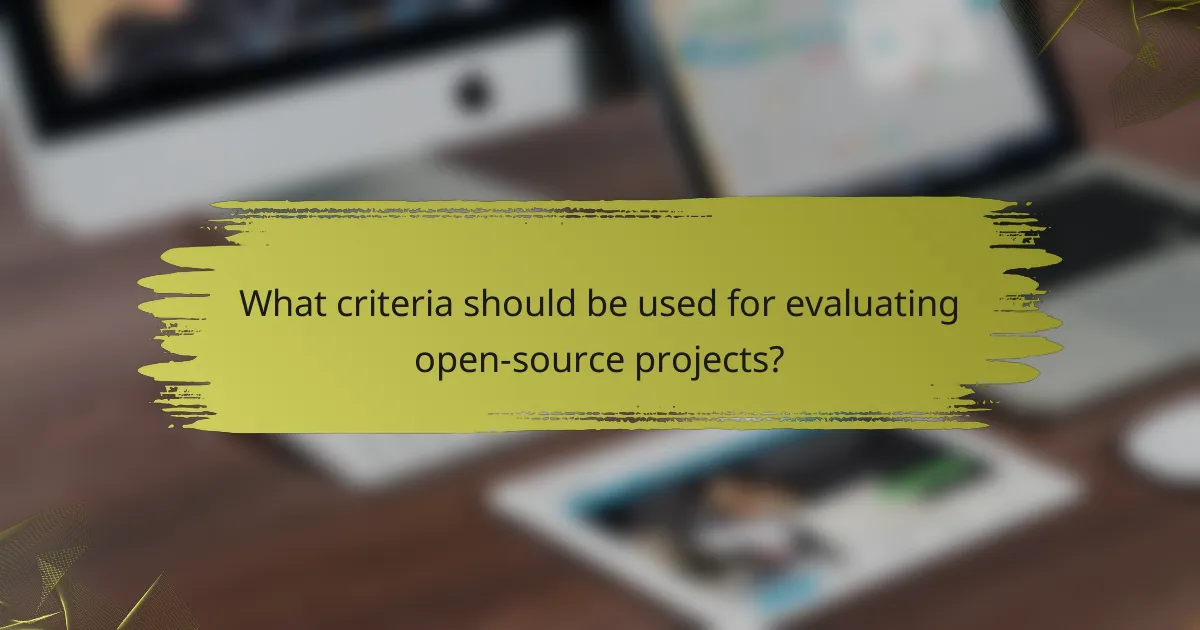
What criteria should be used for evaluating open-source projects?
When evaluating open-source projects for contributions, consider factors such as project sustainability, license compatibility, and technology stack relevance. These criteria help ensure that your efforts align with projects that are both viable and suitable for your skills and interests.
Project sustainability
Project sustainability refers to the long-term viability of an open-source initiative. Assess how actively the project is maintained by looking at recent commits, the frequency of updates, and the responsiveness of the maintainers to issues and pull requests.
Consider the community surrounding the project as well. A vibrant community can provide support and foster collaboration, making it easier to contribute effectively. Look for projects with a clear roadmap and active discussions to gauge their future direction.
License compatibility
License compatibility is crucial when choosing an open-source project to contribute to, as it dictates how you can use, modify, and distribute the software. Familiarize yourself with common licenses like MIT, GPL, and Apache to understand their implications.
Ensure that the project’s license aligns with your intended use and any other projects you may be working on. For example, if you plan to integrate the open-source project into a proprietary application, a permissive license like MIT may be more suitable than a copyleft license like GPL.
Technology stack relevance
The technology stack relevance involves evaluating whether the tools and languages used in the project match your skills and interests. Familiarity with the programming languages, frameworks, and tools can significantly enhance your contribution experience.
Consider projects that use technologies you are passionate about or wish to learn more about. Engaging with a project that aligns with your expertise can lead to more meaningful contributions and a greater impact on the project’s success.
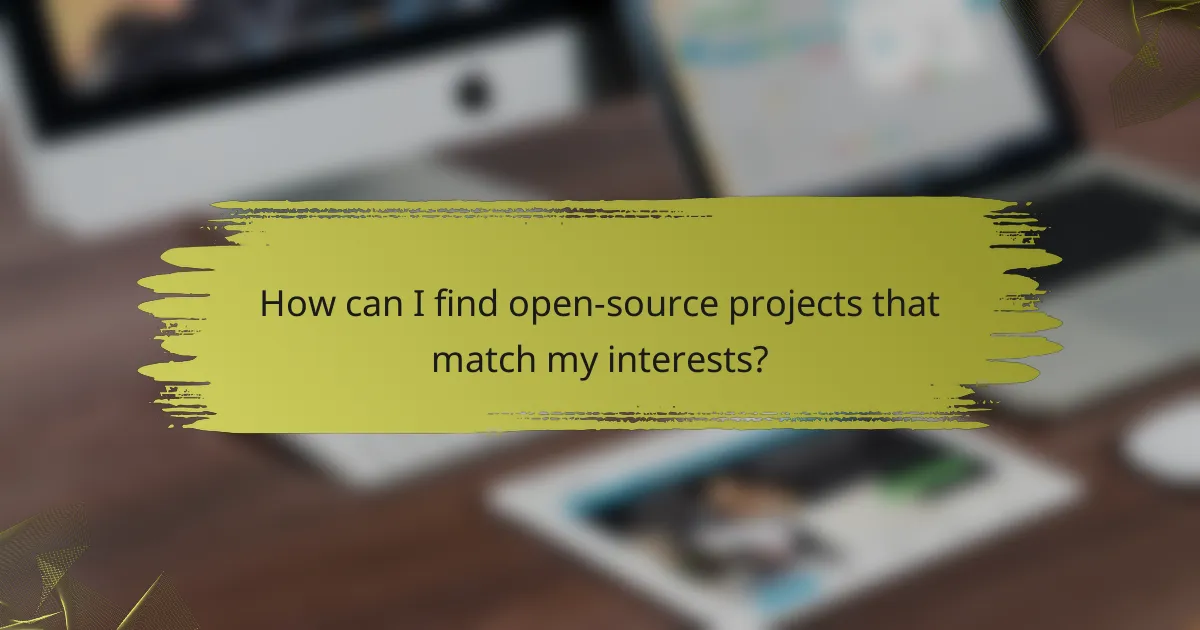
How can I find open-source projects that match my interests?
To find open-source projects that align with your interests, start by identifying your skills and passions. Then, leverage online platforms and resources designed to connect contributors with suitable projects.
Use GitHub search filters
GitHub offers powerful search filters that allow you to narrow down projects based on language, stars, and recent activity. For instance, you can search for repositories in Python with over 50 stars that have been updated in the last month. This helps you find active and popular projects that match your expertise.
When using GitHub, consider exploring topics that interest you. You can filter by specific tags or keywords, making it easier to discover projects that resonate with your personal or professional goals. Additionally, check the contribution guidelines of each repository to ensure they welcome new contributors.
Explore curated lists on Awesome lists
Awesome lists are curated collections of open-source projects organized by topic, making them a valuable resource for finding projects that fit your interests. Websites like Awesome-Lists on GitHub categorize projects into various fields, such as web development, data science, and machine learning.
When browsing these lists, pay attention to the number of stars and recent contributions to gauge the project’s activity level. This can help you prioritize which projects to engage with based on community involvement and support. Remember to review the README files for insights into how you can contribute effectively.
